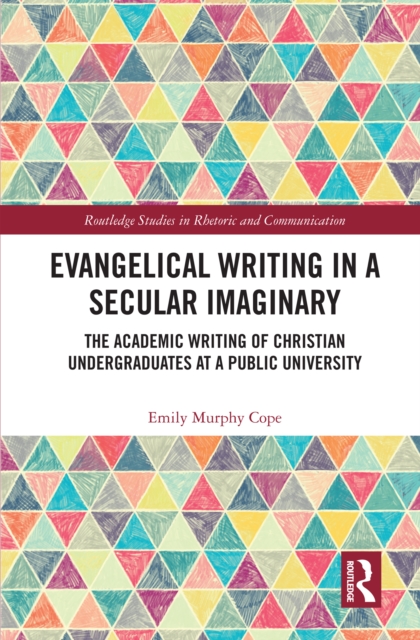
Evangelical Writing in a Secular Imaginary : The Academic Writing of Christian Undergraduates at a Public University EPUB
by Emily Murphy Cope
Part of the Routledge Studies in Rhetoric and Communication series
EPUB
Description
Evangelical Writing in a Secular Imaginary addresses the question of how Christian undergraduates engage in academic writing and how best to teach them to participate in academic inquiry and prepare them for civic engagement.
Exploring how the secular both constrains and supports undergraduates' academic writing, the book pays special attention to how it shapes younger evangelicals' social identities, perceptions of academic genres, and rhetorical practices. The author draws on qualitative interviews with evangelical undergraduates at a public university and qualitative document analysis of their writing for college, grounded in scholarship from social theory, writing studies, sociology of religion, rhetorical theory, and social psychology, to describe the multiple ways these evangelicals participate in the secular imaginary that is the public university through their academic writing. The conception of a "secular imaginary" provides an explanatory framework for examining the lived experiences and academic writing of religious students in American institutions of higher education. By examining the power of the secular imaginary on academic writers, this book offers rhetorical educators a more complex vocabulary that makes visible the complex social forces shaping our students' experiences with writing.
This book will be of interest not just to scholars and educators in the area of rhetoric, writing studies and communication but also those working on religious studies, Christian discourse and sociology of religion.
Information
-
Download - Immediately Available
- Format:EPUB
- Pages:184 pages
- Publisher:Taylor & Francis
- Publication Date:13/02/2024
- Category:
- ISBN:9781003854463
Other Formats
- Hardback from £130.00
- PDF from £31.58
Information
-
Download - Immediately Available
- Format:EPUB
- Pages:184 pages
- Publisher:Taylor & Francis
- Publication Date:13/02/2024
- Category:
- ISBN:9781003854463










